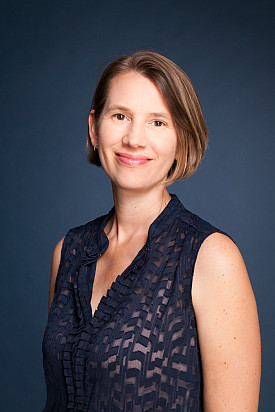News
Southwestern Alumna Founds International Schools
Rebecca Skinner ’96, founder of the International School of Brooklyn, helps build the new Dwight School Dubai as associate head of school.
August 21, 2018
August 21, 2018

An adventurous spirit
In a way, Skinner has been preparing her whole life for her recent move to the Persian Gulf, and it’s clear that she’s undeterred by challenging experiences. As a teenager, she spent two summers working in France as an au pair: “When I went the first time, I didn’t speak any French. I had studied Spanish in Dallas in middle and high school, and I could read and write it but not speak it—typical of American students.” But after being dropped off at a house where the parents were away traveling, the grandmother spoke no English, and her charges were too young to speak any language, Skinner knew it was “sink or swim.” Six weeks later, she was speaking French.
Skinner’s interests in diverse cultures and languages continued at Southwestern, where she majored in international studies and French with a minor in anthropology. The opportunity to learn the language more formally was enriched by Suzanne Chamier, then professor of French and chair of the Department of Modern Languages and Literatures. “Madame Chamier was the most amazing mentor and teacher for me. She really understood my experience. Because of my time at SU, that side of my interests was really nurtured and valued.” Skinner’s studies at Southwestern enabled her to pursue a master’s in French cultural studies at New York University.
Although her degrees were primarily international, Skinner’s work has always been in education. For the first few years after completing her graduate degree, Skinner worked in the nonprofit sector as a grantmaker, specializing in funding for learning programs and institutions, such as The Partnership for After School Education (PASE) and the Louis Calder Foundation. But it wasn’t until she began cultivating the seeds of the school in New York that her passions would come together. Reflecting on her own crash course in the efficacy of language immersion during her teenage years, Skinner partnered with Habiba Boumlik, a fellow multilingual parent who was lamenting the lack of training in spoken languages in local elementary and middle schools. Skinner was inspired: she wanted her own young children, twins Annabelle and Oliver, to grow up in a bilingual educational environment with an international perspective, too. And what began as “wouldn’t it be fun to do this?” wishful thinking eventually evolved into a well-respected brick-and-mortar campus in the heart of Carroll Gardens, Brooklyn.
Changing minds and transforming education
Not that converting an unconventional idea into a reality was without its challenges. “Not only did the school not exist, but the model didn’t exist,” Skinner recalls. “When we were starting ISB, aside from the [Lycée Français de New York] in Manhattan, there really weren’t schools that were doing language immersion. It wasn’t trendy in 2003 to 2005, as it is now.” Consequently, Skinner had to overcome another hurdle: convincing the community to abandon traditional thinking in K–12 education. “People—parents—were very skeptical of the model,” assuming that if children spent time immersed in another language, teachers might shortchange fundamentals such as math, history, reading, and even English. But Skinner was just as undaunted as she had been during her first trip to France. She began educating the community in how schools in other countries successfully integrate bilingual or even trilingual study with exemplary foundations in the liberal arts and sciences.
Another major obstacle was persuading parents to trust her with their children’s educations when she had no prior experience in building or helming a school. But Skinner, ever emboldened by a challenge, pushed forward. Despite lacking startup funds and having to confront the difficulty of locating a suitable space in New York City, she nevertheless found an angel investor and organized a garage sale to raise funds for the security deposit on two classrooms. Foregoing her own salary and surviving only on tuition, she hired two head teachers and two assistant teachers. “It was a very grassroots effort, which was great to be part of, but it was hard,” Skinner admits. Fortunately, ISB’s founding families shared her entrepreneurial spirit, painting classrooms and donating furniture. Even Skinner’s own children shared their toys at school while Skinner herself spent Sundays making modeling dough for the students.
Watching our first cohort graduate in eighth grade and just feeling that we had reached the culmination of what we were trying to build was a pretty powerful experience.
Her efforts paid off, and ISB eventually expanded from its two small classrooms to a campus enrolling more than 300 students in nursery through middle school. “Watching our first cohort graduate in eighth grade and just feeling that we had reached the culmination of what we were trying to build was a pretty powerful experience. I cried through the whole speech,” she remembers lovingly. The external validation of earning various official accreditations while bringing her original vision to fruition was certainly gratifying as well. But as it is for most educators, for Skinner, “being able to watch the students learning and growing —particularly the ones who entered when they were three or four years old—was just incredibly rewarding.” Her role as head of school aside, Skinner is also a proud mother: seeing her own children succeed and graduate eighth grade last year was a highlight of her experience at ISB.
Fostering diverse perspectives through language learning
For Skinner, multilingualism is important because at its core, learning various languages is about communication. She’s seen the impacts in herself as well as in her own children and her students. The effects of language immersion especially are “cognitive,” she says, enhancing one’s “ability to go between situations. For example, when you speak multiple languages, you’re able to transfer ideas. When you understand two or three languages, you start to see commonalities among vocabulary, meaning, and etymology. The brain is constantly looking for connections, similarities, differences.” And the applications are interdisciplinary: “When you do that with language, you easily can transfer that skill to math, science, and reading. That in and of itself is a skill that is highly useful.”
Furthermore, Skinner observes, learning various languages increases the mental flexibility of her students, raising their awareness of multicultural perspectives—even if they haven’t traveled to other countries. If, for example, you understand that azul, bleu, sininen, and blue can all represent one color, you can more readily recognize that different words and worldviews can coexist. And for Skinner and her family, that understanding has enabled them to make the transition from New York to Dubai less difficult: “It’s much easier to be able to be comfortable with living in a Muslim-majority country because there can be different ways to approach faith. [Through language learning, we’ve had] exposure to different ways of thinking and multiple ways to achieve same thing.” Multilingualism can broaden cultural fluency, allowing you to open your mind and adapt more quickly—whether to new nations or to new ideas.
The latest welcome challenge
Dwight School Dubai is a satellite of the original campus, founded in Manhattan in 1872. During her years as head of ISB, Skinner had connected with colleagues at Dwight through professional-development events and discussions of the IB curriculum. Several years ago, she had heard that Dwight was considering opening a new school abroad. But like the origin of ISB, the idea of helping to establish a new international school was just “conceptually interesting,” and moving to the Middle East specifically wasn’t yet part of that concept.
Flash forward to 2018, and Skinner is now in Dubai, working with Head of School Janecke Aarnaes, who speaks eight languages and has served as an educational leader for 22 years. Skinner and Aarnaes collaborate well, combining their “startup experiences as educators” and international perspectives to make decisions. Skinner feels right at home in Dwight School Dubai’s IB curriculum, so she’s focusing her efforts on familiarizing herself with the ins and outs of the UAE education system, which entails more administrative regulations than New York independent schools do. Intrepid as ever, she says, “I’m definitely learning so much every day: why it’s that way, what vision and goals the local regulatory body has.” But she’s also just excited about welcoming new teachers from New York, London, and Seoul—and students from across the globe.
Planting the seeds at Southwestern
When looking back at how her undergraduate experience influenced her career, Skinner says emphatically, “I 100% see the seeds. What I studied … really allowed me to think about language in the way I described, with the impact and value it brings to the students.” In addition to remembering Madame Chamier fondly, Skinner also greatly admired Gwen Kennedy Neville, once Elizabeth Root Paden Chair in Sociology and now the namesake of an annual award honoring the most outstanding SU student in anthropology. Skinner appreciates how these professors “took the time to get to know me and my interests and how to nurture them. That’s been a great inspiration for me in starting ISB and what I want Dwight School Dubai to be, such as personalized education and understanding that kids are motivated when teachers take a personal interest in them. I had that at SU, and it was a big influence on me.” While a student, Skinner was particularly drawn to courses in which she and classmates read ethnographic novels and thought about Francophone experience. “Exploring those concepts had a huge impact on my career,” she says.
So far, that career has exemplified the importance of perseverance and confidence in the face of significant challenges. Skinner believes that two elements are crucial to successful leadership: vision and communication. Reflecting on leaders she’s relied on and her own approach, she remarks, “Leaders have a clear sense of vision and must be constantly communicating about that because it really gives the people in the organization something to work toward—a purpose, a goal.” And regardless of her successes so far, Skinner promises that she will always strive to improve at “communication, communication, communication. You’re constantly having to [make] sure vital information is getting to the right people the right way at the right time.”
When colleagues and parents at ISB were asked to describe Skinner’s work as head of school, they emphasize not just her resourcefulness and creative problem-solving but also her compassion, kindness, and grace. That commitment to communication and community are apparent in her honest words of advice to current Southwestern students: “One regret I have is that I think I had one science requirement, and I didn’t really think of myself as someone who liked science, so I saved it to last semester. I took a biology course, but I ended up loving that class, and if I’d had the courage to take that class earlier, I wonder if I would have done something differently… .That’s the beauty of a liberal arts education: you get the opportunity to experience those other classes that you wouldn’t expect you’d like.” Skinner might regret that she didn’t pursue more courses in the sciences, but the field of K–12 education has certainly benefited from her continuing dedication to promoting language study, diverse perspectives, and intercultural understanding among students around the world, from New York to Dubai.















